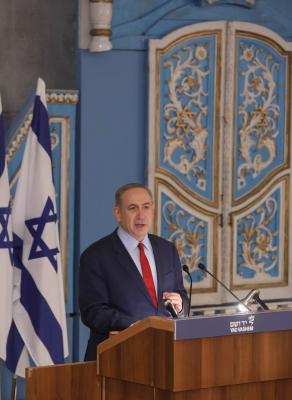26 January 2017
On 26 January, Yad Vashem hosted members of the international diplomatic community at an event marking the International Day of Commemoration in Memory of the Victims of the Holocaust. Ambassadors and representatives from over 50 countries attended the event, including France, Germany, Hungary, Italy, Lithuania, Poland, Spain, the United States, Canada and Russia.
"This day of commemoration and the memory of the victims of the Holocaust is fraught with significance," remarked Israel's Prime Minister Benjamin Netanyahu. "We are fulfilling our obligation never to forget and to keep in mind that every victim had a story, a family, a childhood, a future cut short, and as you go through these halls at Yad Vashem you see these individual stories."
Following the Prime Minister's remarks, Director of Yad Vashem's International Institute for Holocaust Research Dr. Iael Nidam Orvieto spoke to the diplomats present. "Our mission and message are now more crucial than ever. Today, destructive evil, including vicious antisemitism, reappears in various contexts and ideologies. These ideologies deny human rights and dignity. Together with partners and associates worldwide, Yad Vashem teaches researchers and educators – thousands every year, from dozens of nations, including nations represented here today - to draw contemporary insights from the annals of the Shoah."
Orvieto presented a diary kept by Ruth Kalka (née Brzoska) during the Shoah. Ruth and Mayer Kalka were married in Czestochowa, Poland, in 1942. Following the deportation of their extended families to Treblinka, Ruth and Mayer decided to escape from the ghetto. For two years they hid from the Nazis, running between the forest and various places of refuge until liberation in 1945. Throughout this time, Ruth kept a diary in a small notebook encased in metal. Most of the diary consists of names, dates and key events. After the war, Ruth rewrote her memoirs in detail in another notebook. Dr. Orvieto concluded her presentation with the words of Ruth Kalka who wrote after witnessing and barely escaping the murder of six of her friends by the Nazis, "They wanted so much to live. Now they lie in the forest, their blood washed away by the warm rain. We remain alive. But for what? For whom?"
In October 1945, Ruth and Mayer went to Bad Reichenhall, a Displaced Persons Camp in Germany, where their son Jacob was born. In 1949, they immigrated to Israel, where Ruth gave birth to Hadassa. The diary was recently donated to Yad Vashem by their children during a collection day of the Yad Vashem "Gathering the Fragments" campaign, which seeks Holocaust-era artifacts, documents and photographs currently held by private citizens in order to properly preserve them for prosperity.
In addition to remarks offered by Netanyahu and Orvieto, the diplomats toured the Yad Vashem exhibition, "Stars Without a Heaven," which depicts different aspects of children's lives during the Holocaust.
Members of Yad Vashem's leadership are also participating in several other events around the world marking International Holocaust Remembrance Day. Yad Vashem Director-General Dorit Novak participated today in a roundtable discussion on the topic "Educating for a Better Future: The Role of Historical Sites and Museums in Holocaust Education" at the UNESCO conference in Paris.







